Full list
| Key |
|---|
| Match had two awarded penalties |
| Match had three awarded penalties |
| * Next goal was scored in the episode caused by unrealized penalty |
This article is being considered for deletion in accordance with Wikipedia's deletion policy. Please share your thoughts on the matter at this article's deletion discussion page. |
This list includes all penalties awarded at the FIFA World Cup since 1930. It does not includes penalty shoot-outs that took place after regulation and extra time of knockout matches.
| Key |
|---|
| Match had two awarded penalties |
| Match had three awarded penalties |
| * Next goal was scored in the episode caused by unrealized penalty |
| Tournament | Number of matches | Penalties awarded | PPG | Penalties realized | Penalties saved | Penalties missed | Realization, % |
|---|---|---|---|---|---|---|---|
| | 18 | 4 | 0.22 | 1 | 3 | 0 | 25.0 |
| | 17 | 4 | 0.24 | 3 | 1 | 0 | 75.0 |
| | 18 | 5 | 0.28 | 3 | 1 | 1 | 60.0 |
| | 22 | 3 | 0.14 | 3 | 0 | 0 | 100.0 |
| | 26 | 8 | 0.31 | 7 | 0 | 1 | 87.5 |
| | 35 | 10 | 0.29 | 7 | 1 | 2 | 70.0 |
| | 32 | 8 | 0.25 | 8 | 0 | 0 | 100.0 |
| | 32 | 8 | 0.25 | 8 | 0 | 0 | 100.0 |
| | 32 | 5 | 0.16 | 5 | 0 | 0 | 100.0 |
| | 38 | 8 | 0.21 | 6 | 2 | 0 | 75.0 |
| | 38 | 14 | 0.37 | 12 | 2 | 0 | 85.7 |
| | 52 | 10 | 0.19 | 8 | 0 | 2 | 80.0 |
| | 52 | 16 | 0.31 | 12 | 2 | 2 | 75.0 |
| | 52 | 18 | 0.35 | 13 | 2 | 3 | 72.2 |
| | 52 | 15 | 0.29 | 15 | 0 | 0 | 100.0 |
| | 64 | 18 | 0.28 | 17 | 0 | 1 | 94.4 |
| | 64 | 18 | 0.28 | 13 | 5 | 0 | 72.2 |
| | 64 | 17 | 0.27 | 13 | 1 | 3 | 76.5 |
| | 64 | 15 | 0.23 | 9 | 5 | 1 | 60.0 |
| | 64 | 13 | 0.20 | 12 | 1 | 0 | 92.3 |
| | 64 | 29 | 0.45 | 22 | 4 | 3 | 75.9 |
| | 64 | 23 | 0.36 | 17 | 5 | 1 | 73.9 |
| Total | 964 | 269 | 0.28 | 214 | 35 | 20 | 79.5 |
| Stage | Number of matches | Penalties awarded | PPG | Penalties realized | Penalties saved | Penalties missed | Realization, % |
|---|---|---|---|---|---|---|---|
| (First) Group stage | 676 | 179 | 0.26 | 142 | 24 | 13 | 79.3 |
| Second group stage (1974, 1978, 1982) | 36 | 7 | 0.19 | 4 | 3 | 0 | 57.1 |
| Final group stage (1950) | 6 | 1 | 0.17 | 1 | 0 | 0 | 100.0 |
| Round of 16 | 97 | 35 | 0.36 | 29 | 4 | 2 | 82.9 |
| Quarter-finals | 70 | 21 | 0.30 | 14 | 4 | 3 | 66.7 |
| Semi-finals | 38 | 10 | 0.26 | 10 | 0 | 0 | 100.0 |
| Third place play-off | 20 | 7 | 0.35 | 6 | 0 | 1 | 85.7 |
| Final | 21 | 9 | 0.43 | 8 | 0 | 1 | 88.8 |
| Total | 964 | 269 | 0.28 | 214 | 35 | 20 | 79.5 |

The 1930 FIFA World Cup was the inaugural FIFA World Cup, the world championship for men's national football teams. It took place in Uruguay from 13 to 30 July 1930. FIFA, football's international governing body, selected Uruguay as host nation, as the country would be celebrating the centenary of its first constitution and the Uruguay national football team had successfully retained their football title at the 1928 Summer Olympics. All matches were played in the Uruguayan capital, Montevideo, the majority at the Estadio Centenario, which was built for the tournament.

The 1990 FIFA World Cup was the 14th FIFA World Cup, a quadrennial football tournament for men's senior national teams. It was held from 8 June to 8 July 1990 in Italy, the second country to host the event for a second time. Teams representing 116 national football associations entered and qualification began in April 1988. 22 teams qualified from this process, along with host nation Italy and defending champions Argentina.
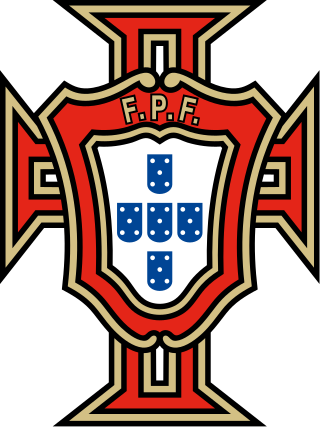
The Portugal national football team has represented Portugal in international men's football competition since 1921. The national team is controlled by the Portuguese Football Federation (FPF), the governing body for football in Portugal. Portugal's home matches are played at various stadiums throughout Portugal, and its primary training ground and technical headquarters, Cidade do Futebol, is located in Oeiras. The head coach of the team was most recently Fernando Santos, who stepped down after the 2022 World Cup, and the captain is Cristiano Ronaldo, who also holds the team records for most caps and most goals.
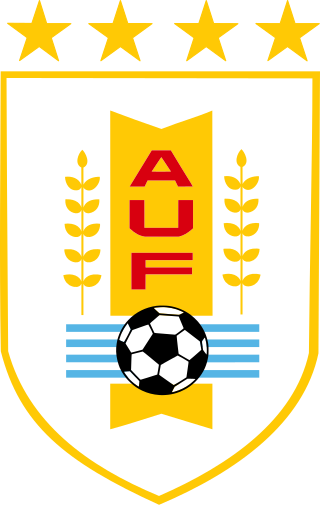
The Uruguay national football team represents Uruguay in international football, and is controlled by the Uruguayan Football Association, the governing body for football in Uruguay. The Uruguayan team is commonly referred to as La Celeste.

The Switzerland national football team represents Switzerland in international football. The national team is controlled by the Swiss Football Association.

The Egypt national football team, known colloquially as "the Pharaohs", represents Egypt in men's international football, and is governed by the Egyptian Football Association (EFA), the governing body of football in Egypt. The team's historical stadium is Cairo International Stadium, although matches are sometimes played at Borg El Arab Stadium in Alexandria.
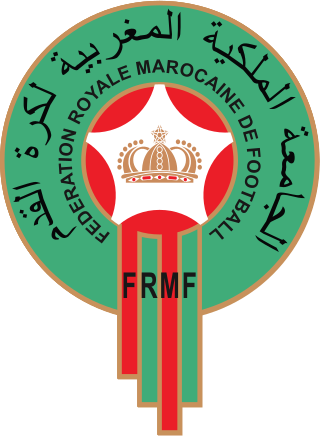
The Morocco national football team, nicknamed "the Atlas Lions", represents Morocco in men's international football competitions. It is controlled by the Royal Moroccan Football Federation, also known as FRMF. The team's colours are red and green. The team is a member of both FIFA and the Confederation of African Football (CAF).

The Tunisia national football team represents Tunisia in men's international association football. The team is a member of both FIFA and CAF, the Confederation of African Football. It is governed by the Tunisian Football Federation, founded in 1957. Colloquially known as the Eagles of Carthage, the team's colours are red and white, and the bald eagle is its symbol. Most of Tunisia's home matches are played at the Stade Olympique de Radès in Radès since 2001. Jalel Kadri has been coaching the team since 30 January 2022.
As of the 2022 FIFA World Cup, 80 national teams have competed at the finals of the FIFA World Cup. Brazil is the only team to have appeared in all 22 tournaments to date, with Germany having participated in 20, Italy and Argentina in 18 and Mexico in 17. Eight nations have won the tournament. The inaugural winners in 1930 were Uruguay; the current champions are Argentina. The most successful nation is Brazil, which has won the cup on five occasions. Five teams have appeared in FIFA World Cup finals without winning, while eleven more have appeared in the semi-finals.

Horacio Marcelo Elizondo is an Argentine former international football referee best known for his officiation throughout the 2006 FIFA World Cup. Having achieved all his goals in refereeing, Elizondo retired after the December 2006 match between Boca Juniors and Lanús, 2 years before the compulsory retirement age of 45.

The 1998 FIFA World Cup final was the final match of the 1998 FIFA World Cup, the 16th edition of the quadrennial football competition organised by FIFA for the men's national teams of its member associations. The match was played at the Stade de France in Paris, France, on 12 July 1998, and was contested by Brazil and France. The tournament featured France as the hosts, Brazil as the winners of the previous World Cup and 30 other teams who emerged from the qualification tournaments organised by the six FIFA confederations. The 32 teams competed in a group stage, from which 16 teams qualified for the knockout stage. En route to the final, Brazil finished first in Group A, with two wins and one defeat, after which they beat Chile in the round of 16, Denmark in the quarter-finals and the Netherlands in a penalty shoot-out in the semi-finals. France finished top of Group C with three wins, before defeating Paraguay in the round of 16, Italy in the quarter-final, and Croatia in the semi-final. The final took place in front of 75,000 supporters, with an estimated 1.7 billion watching on television, and was refereed by Said Belqola from Morocco.

The Netherlands national football team has represented the Netherlands in international men's football matches since 1905. The men's national team is controlled by the Royal Dutch Football Association (KNVB), the governing body for football in the Netherlands, which is a part of UEFA, under the jurisdiction of FIFA. They are widely considered one of the best national teams in world football and widely regarded as one of the greatest national teams of all time. Most of the Netherlands' home matches are played at the Johan Cruyff Arena, De Kuip, Philips Stadion and De Grolsch Veste.

This is a record of Argentina's results at the FIFA World Cup. Argentina won three World Cups: in 1978, 1986 and 2022. Argentina have also been runners up three times: in 1930, 1990 and 2014. In 18 World Cup tournaments, Argentina have 47 victories in 88 matches. The team was present in all but four of the World Cups, being behind only Brazil and Germany in number of appearances.
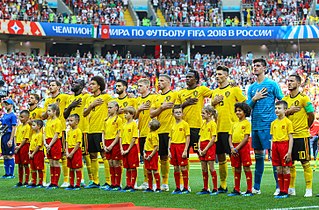
Belgium have appeared in the finals tournament of the FIFA World Cup on 14 occasions, the first being at the first FIFA World Cup in 1930 where they finished in 11th place and played the first ever World Cup match against the United States. The inaugural FIFA World Cup final was officiated by Belgian referee John Langenus.
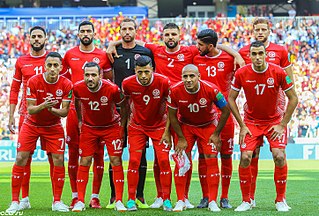
Tunisia has participated six times in the FIFA World Cup, the biggest men's football event in the world, in 1978, 1998, 2002, 2006, 2018 and 2022. Tunisia has never been able to advance past the group stage on any of these occasions; they have played eighteen games, winning three, with five draws and ten defeats. The selection played its first qualifying match for a World Cup on 30 October 1960 against Morocco at the Stade d'Honneur, Casablanca.
The 2016 OFC Nations Cup Final was a football match that took place on 11 June 2016 at the Sir John Guise Stadium, Port Moresby. It was the final match of the 2016 OFC Nations Cup, the 10th edition of the OFC Nations Cup, a competition for national teams in Oceania.
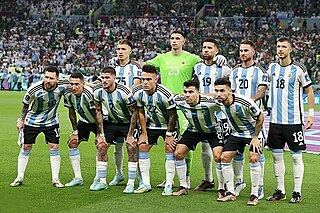
The 2022 FIFA World Cup final was a football match, the culmination of the 2022 FIFA World Cup, the 22nd edition of FIFA's competition for men's national football teams. The match was played at Lusail Stadium in Lusail, Qatar, on 18 December 2022 and was contested by Argentina and 2018 champions France. Refereed by Szymon Marciniak from Poland, the final took place in front of 88,966 fans.